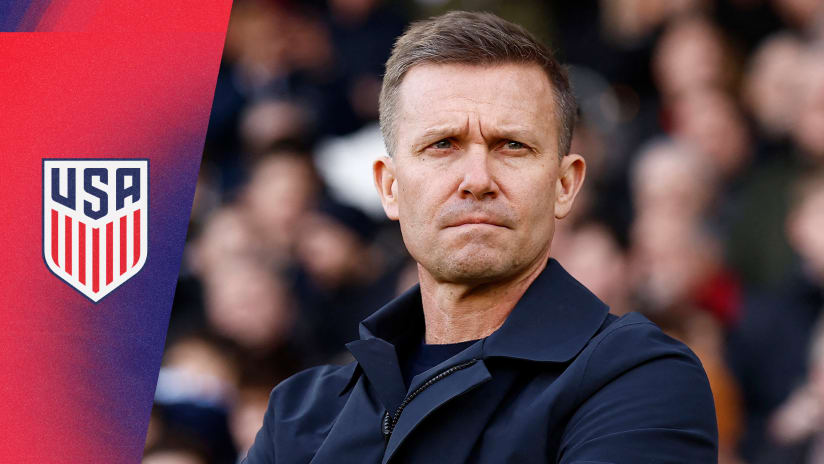The most prominent North American manager in world soccer lost his job on Monday, when Leeds United dismissed Jesse Marsch following a grisly 1-0 loss to fellow English Premier League strugglers Nottingham Forest that sinks the Whites to a whisker’s breadth from the relegation places.
On one level, it’s entirely unsurprising that this news has increased the chatter about Marsch’s suitability for the US men’s national team’s vacant head coaching position before the program co-hosts the 2026 FIFA World Cup and possibly features in the 2024 Copa América.
The former CF Montréal and New York Red Bulls boss heads a very short list of US coaches who’ve ascended to No. 1 gigs in one – in his case two – of Europe’s elite leagues.
Marsch was a twice-capped USMNTer in his own playing days and an assistant coach from 2010-11. He played and coached in MLS before setting off on his trans-Atlantic adventure, and also showed a deep understanding of the US player pool in some spot work as an analyst for MLSsoccer.com. Having worked under both Bruce Arena and Bob Bradley, and been in charge of Tyler Adams, Brenden Aaronson, Aaron Long and Weston McKennie, both his coaching family tree and his recent track record have ample USMNT flavor.
On another level, it’s a bit strange that getting fired in such disheartening circumstances, after lasting less than a year at his last two clubs, has seemingly elevated Marsch’s name for the national team post. On a strictly logistical basis, the timing seems suboptimal, given that U.S. Soccer president Cindy Parlow Cone recently laid out a six- to nine-month timeline for identifying and hiring a sporting director, then tasking that person with leading the selection of the next USMNT coach. Would Marsch wait around that long, even if he’s still getting paid by Leeds?
What the numbers say
Then there are some sobering stats. Marsch compiled a record of 8W-9L-4D in a fleeting Bundesliga stint at RB Leipzig before going 11W-16L-10D at LUFC. Those are not the kind of numbers you’d typically associate with a frontrunner for arguably the biggest USMNT hire of the past quarter-century.
Context is key here. Leipzig are a BuLi giant now, intent on competing for that league’s top spot every season (as quixotic as that may appear in light of Bayern Munich’s 10 straight titles) as well as making deep runs in UEFA Champions League. And Marsch led LUFC to Premiership survival after inheriting a mess – he succeeded a deeply revered manager, Marcelo Bielsa, who’d nonetheless just overseen a woeful skid of four lopsided losses in which Leeds had conceded 17 goals and scored two, the worst month in Prem history, leaving them with a league-worst 60 goals allowed up to that point in the season.
Still, when you combine his past two jobs with his lack of national-team head coaching experience, it prompts about as many questions as answers from a USMNT perspective. Then there’s the matter of whether his Red Bull-influenced, high-press-oriented ideology would make for a suitable evolution from Gregg Berhalter’s more cerebral game model, or a jarring change in direction that amounts to a full reset, and thus a marginalizing of what the Yanks spent the last four years working on.
A matter of birthright?
Whatever your outlook on Marsch, it’s hard to escape the distinct sense that his nationality is a factor in him being connected to the USMNT opening.
Over the years many in and around the U.S. federation have suggested, both publicly and behind closed doors, that the head coach of the national team should hail from the country, or have spent enough time here to fully understand the unique quirks that make American soccer different. There’s also a patriotic line of reasoning that the person prowling the technical area represents the flag just as much as the players or kits do. Then-U.S. Soccer president Carlos Cordeiro hyped Berhalter’s as “an identity and approach that will be uniquely and fiercely American” when his hiring was announced in 2018, for example.
Some have gone so far as to cite the factoid that no national team has ever won a World Cup with a foreign manager in charge. That may look like a powerful statement at first glance but doesn’t quite stand up to deeper analysis, considering what a small fraternity the club of world champions really is, and how profoundly developed their footballing cultures really are in comparison to the United States’. Correlation is not causation, after all.
The USMNT have had just one foreign-born head coach in the past 28 years – Jurgen Klinsmann – and a central, explicit aspect of his appeal was his having lived in California for many years, thus developing a deep knowledge of the domestic landscape. (Perhaps ironically, the current manager of the long-globally-dominant US women’s national team, Vlatko Andonovski, originally hails from overseas, as do his three most recent predecessors.)
In practical terms, confining the USMNT coaching search to Americans or candidates with deep US résumés drastically shrinks the pool of available candidates. Such a decision would deserve deep scrutiny on those grounds alone. We could surmise that it’s not the case in light of reports that Zinedine Zidane was sounded out about his interest in the job, though the timeline suggests it was Earnie Stewart making that overture, and he since announced his departure from the fed’s sporting director position.
Does it take an American coach to understand and inspire the American player? Some find that idea compelling, while others prefer to track down the best candidate available regardless of nationality. Setting aside tactical philosophies and game models for the time being, Leeds United’s decision on Marsch underlines just what a pivotal facet of the USMNT hiring process these questions really are.













